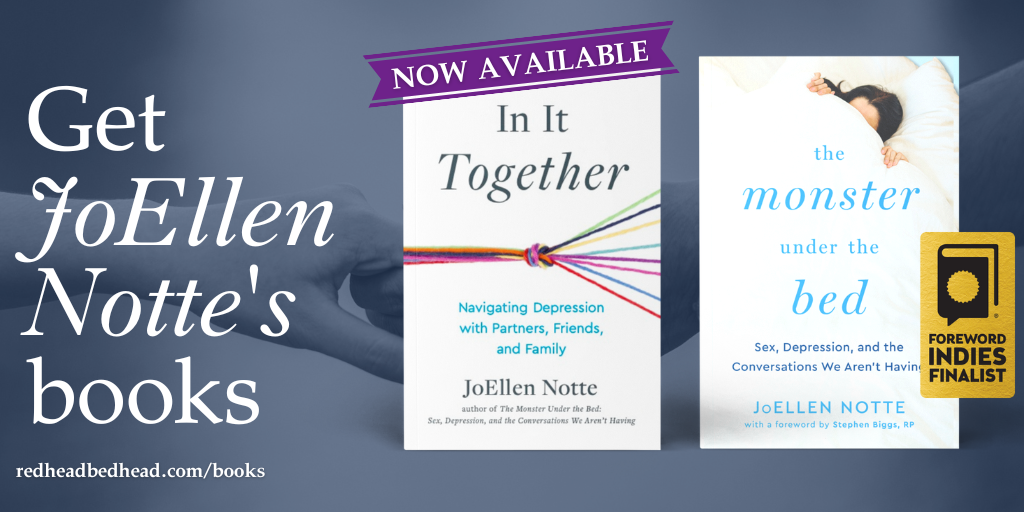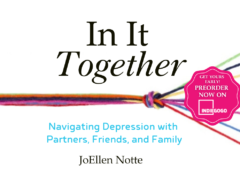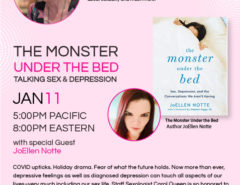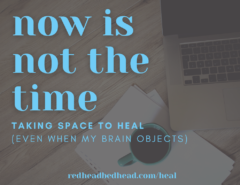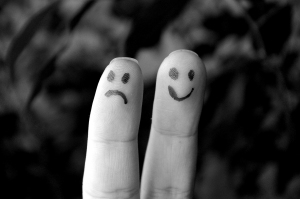 I’ve been so excited to see more mainstream conversations about depression happening lately. I’ve even been seeing more folks talking about how depression affects sexuality, which is amazing! However there is one thing that I have seen a couple of times now that gives me pause and I want to take a moment here to address it. Folks have been writing about staying sexual through depression (I’ve written about it myself) and this one piece of advice has popped up a couple of times now and I think we need to discuss it. That piece of advice?
I’ve been so excited to see more mainstream conversations about depression happening lately. I’ve even been seeing more folks talking about how depression affects sexuality, which is amazing! However there is one thing that I have seen a couple of times now that gives me pause and I want to take a moment here to address it. Folks have been writing about staying sexual through depression (I’ve written about it myself) and this one piece of advice has popped up a couple of times now and I think we need to discuss it. That piece of advice?
“Just do it!”
We seem to be in agreement that whether it be due to side effects from medication or that “loss of interest” you always hear people talk about with depression (I always think we should be more honest and just call that “everything is suddenly impossible”) folks who are dealing with depression are frequently faced with the issue of not being interested in sex. This can a problem on several levels.
As I’ve said in the past, it can contribute to that feeling of “other” that comes with depression- deepening that chasm between the depressed person and the “normal” world. It can create friction with partners, especially when for them it can feel like they are being personally rejected. (For more on this check out It’s Not You: 4 Signs Your Partner’s Too Depressed to Have Sex)
So here we are, dealing with depression, dealing with loss of libido or interest in sex, looking for ways to stay in touch with our sexual selves and we have some well-meaning folks telling us to “Just do it!”, why is this problematic?
Well, let’s take the advice apart. I’ve seen it come from two different angles: 1. If you’re in a relationship, do it for the health of the relationship and out of love for your partner. 2 If you are lying there thinking you’re not interested in sex, once you have it you’ll remember that it feels good and get that endorphin rush and ultimately be glad you did it.
However…
Let’s look at some of the symptoms and feelings that can come with depression.
Worthlessness, guilt, a sense of defeat, defectiveness are all possible symptoms that depression suffers may be experiencing. They can all contribute to a general feeling that one’s own needs don’t matter, that the depressed person isn’t important enough to have what they want/need considered. Something ironic about depression is that it makes you very self-focused, you think about your own needs all the time- but it also often makes you feel powerless to fulfill those needs.
Understanding that, it seems to me that telling depressed people to make themselves do something that they do not want to do is a dangerous proposition on a couple of levels.
When it comes to the “please your partner” argument (one I feel strongly about as I had a therapist use it on me), I just can’t abide by this. Yes, partners are important (that’s a whole other conversation) but a tactic that approaches a person who may already be struggling with feelings of guilt and essentially guilts them into sex feels incredibly wrong to me. Further, telling someone who is already struggling with the overwhelming feeling that their needs do not matter and everyone else is more important/valuable than them to just suck it up and put aside their feelings of not wanting to so as to satisfy their partner is just wrong. This whole approach seems to take a person who feels defeated and beat them down more. This, to me, feels like approaching a person whose mind feels like it has been hijacked by this illness and taking away their control over their body.
As for the “try it, you might like it” argument, this one I can see some value to. I remember times when, in the depths of depression, I had sex and thought “Oh, right, sex! Why don’t I do this more?” But still, an argument that hinges on “You’re supposed to like this, you’re supposed to do this. Do it because, sex.” being presented to someone who is already feeling defective, already feeling like they are “other” from the “normal” world smacks of advice being given by people who don’t know what depression is. That kind of advice is usually well-meaning and has a kernel of truth hidden in it somewhere but is ultimately a bit wrongheaded. I’m never a fan of forcing yourself to fuck with your teeth gritted because, hey, midway through you might like it. Here’s the thing, midway through you might not and instead feel even more broken then you felt before you started.
So, what’s the answer? Abandon sex while depressed? Give up?
No. I don’t think that’s it. I’m putting forth a challenge to my friends dealing with depression(and I know it is a challenge, so bear with me) don’t “just do it” but also, don’t “just not do it”. Make conscious decisions about sex. Think about it a bit every day. I said before that there was a kernel of truth in the “just do it because you might figure out you wanted to after all” advice and here’s that kernel: If, upon examining your feelings you find that it’s not that you don’t want sex, it’s that you want it but you are struggling with acting on the impulse (because depression can do that- stuff suddenly seems super onerous) this might be a time you consider “just doing it”. If however, you sit with it and the idea of having sex “seems totally foreign”, or “actively turn(s) your stomach” (both actual ways folks with depression have described feeling about sex to me) and you’re just not there at all, this might be a time to step away for a bit.
Another benefit to making conscious decisions sexually when dealing with depression is that you take the control back from the depression. What can happen is that we know depression (and meds) can affect libido so if we don’t want sex we chalk it up to depression and we forget to listen to ourselves. By making conscious choices you become better at recognizing when your desire is being affected by the illness (or meds). You become tuned into yourself. I’ll give you an example: You can be with a partner who you love and are comfortable with and when the sex wanes you blame it on depression and keep on going the way you were. Suddenly one day you feel desire, but not for your partner and realize that what happened there was that you had just assumed everything was about the depression so when you stopped being sexually into your partner, you missed it. Bad scene.
The final benefit of making conscious decisions is that you can keep your partner in the loop. It can be really difficult for partners of people with depression and they can often feel like they are in the dark with their life being dictated by their partner’s illness. Being more aware allows you to say “Ok, this is where I’m at today” and communication is great for any relationship.
Depression doesn’t have to be a sex life killer but you also shouldn’t have to force yourself to do anything. Checking in with yourself and making active, conscious choices can help you maintain a sex life that you enjoy and feel safe and comfortable in.
Please seek professional help if depression is leading to thoughts of suicide or making it difficult to care for yourself. Visit Mentalhealth.gov for resources or call the National Suicide Prevention Lifeline (you DO NOT have to be suicidal to use this service) at 1.800.273.8255
